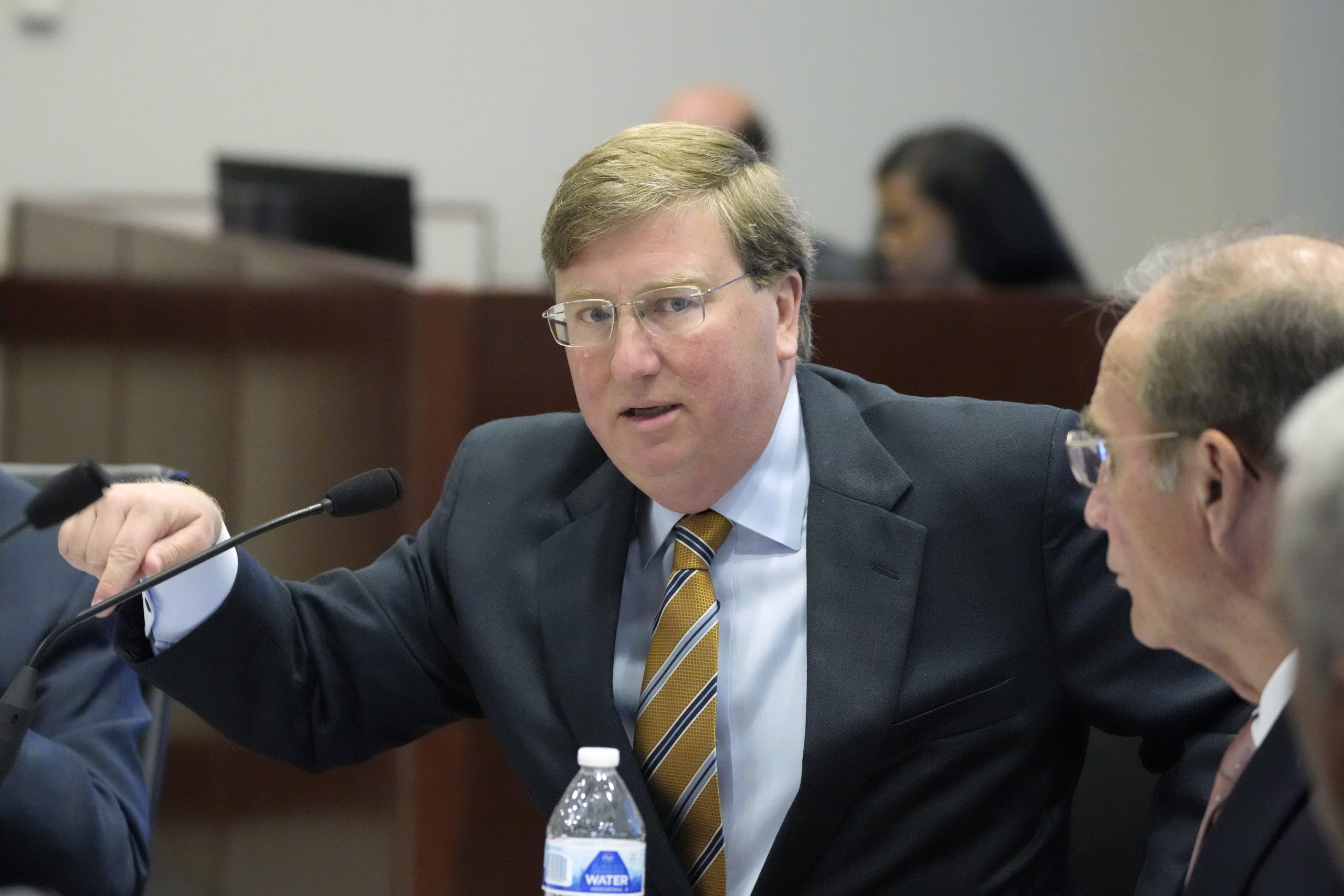[ad_1]
Recently reelected Gov. Tate Reeves and legislative leaders could not agree Wednesday on an official estimate of how much money will be available as they begin setting next year’s state budget.
Reeves said he supports a higher revenue estimate because that would make it easier for legislators to approve his proposal to eliminate state income taxes during the 2024 session.
“For those of us very interested in cutting taxes during this legislative session, arbitrarily lowering the number for no apparent reason hurts our ability to justify those tax cuts,” Reeves told the legislative leaders, including newly reelected Lt. Gov. Delbert Hosemann and outgoing House Speaker Philip Gunn. “I am a very strong proponent of cutting taxes during this session. I am going to be regardless of what this number is.”
Normally, the fall meeting of the governor and the 14 members of the Legislative Budget Committee is a routine event and adopting an estimate is pro forma. But such was not the case Wednesday morning as it soon became apparent Reeves was blindsided by his Republican legislative colleagues. They wanted to adopt a revenue estimate $117.8 million less than recommended by the group of five state financial experts whose recommendations are normally rubber-stamped by the politicians.
Reeves said he believed he was attending the meeting to adopt the recommendation of the experts of projected revenue $7.64 billion for the upcoming fiscal year. Instead, the committee members approved the lower number, the same estimate as for the current budget year.
“I guess I am kind of caught off guard. I did not anticipate there would be a change,” Reeves said.
Rep. Angela Cockerham, I-Magnolia, was the only member of the Budget Committee not to vote for the lower estimate.
Mississippi law mandates that the governor and members of the Legislative Budget Committee agree on a revenue estimate as a starting point in developing a state budget during the upcoming session. In 2002, then-Gov. Ronnie Musgrove and the committee did not agree on an estimate.
It is likely legislators will start work on a budget based on the estimate adopted by the budget committee members Wednesday. And importantly, state law allows committee members to meet at the end of the session to revise the estimate from the fall meeting they have with the governor.
In other words, the impact of Wednesday’s deadlock is most likely symbolic, highlighting the focus Reeves plans to place on eliminating the income tax during the 2024 session. In 2022, the Legislature passed a $525 million income tax cut phased in over four years. Reeves wants to fully eliminate the income tax, which accounts for about one-third of the state general fund revenue.
READ MORE: State revenue slows as phase-in of income tax cuts begins
House Pro Tem Jason White, R-West, who is expected to succeed Gunn as speaker, said he was supporting the lower revenue estimate, but that did not mean that the House would not be working to cut taxes during the 2024 session.
“I think that (cutting taxes) is the aim of most of the people around this table,” White said. “… I anticipate the House will be back with an income tax cut plan sometime in the very near future.”
Reeves told Hosemann he would support the lower estimate if he would say he anticipated the Senate passing an income tax cut during the upcoming session. Hosemann presides over the Senate.
“We anticipate there will be tax relief this year,” Hosemann responded. “Now whether that is grocery tax (sales tax on food) income tax or other taxes, I can’t tell you that because … I don’t vote. They (senators) all vote. Whether I say it doesn’t make much difference.”
Hoseman said the Senate has passed tax cuts in the past and said there is no reason to think that will change going forward.
But he did say the lower estimate should be adopted because revenue for the past two months has been lower than the official estimate approved for the current budget year. If revenue falls too far below the estimate, the governor and-or Legislature would be forced to make cuts or dip into reserve funds to make mid-year adjustments.
State Economist Corey Miller, who is on the group of five state financial experts who provide a consensus estimate to the politicians, testified at the meeting that the anticipation is that the state economy will slow in 2024 and 2025, though, chances of a national recession are low.
[ad_2]
Source link
